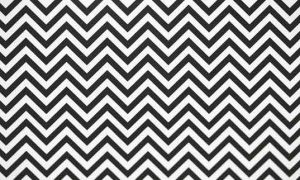Advertisement
Advertisement
zigzag
[zig-zag]
noun
a line, course, or progression characterized by sharp turns first to one side and then to the other.
one of a series of such turns, as in a line or path.
adjective
proceeding or formed in a zigzag.
zigzag stitches.
adverb
with frequent sharp turns from side to side; in a zigzag manner.
The child ran zigzag along the beach.
verb (used with object)
to make (something) zigzag, as in form or course; move or maneuver (something) in a zigzag direction.
They zigzagged their course to confuse the enemy.
verb (used without object)
to proceed in a zigzag line or course.
zigzag
/ ˈzɪɡˌzæɡ /
noun
a line or course characterized by sharp turns in alternating directions
one of the series of such turns
something having the form of a zigzag
adjective
(usually prenominal) formed in or proceeding in a zigzag
(of sewing machine stitches) produced in a zigzag by a swing needle used for joining stretch fabrics, neatening raw edges, etc
adverb
in a zigzag manner
verb
to proceed or cause to proceed in a zigzag
(tr) to form into a zigzag
Other Word Forms
- zigzaggedness noun
- zigzagger noun
Word History and Origins
Word History and Origins
Origin of zigzag1
Example Sentences
They try to hide under trees and the shadows of buildings, and run in zigzags when drones start chasing them.
This is his Pynchoniad, a zigzagging epic of America and the world through our bloodiest, most shameful hundred years.
Sandy Yang’s home, whose form is inspired by the area’s zigzagging mountains, is designed to help a couple without children form their own vibrant community.
Their filmography zigzags between thrillers and comedies, lean exercises and awards heavyweights, never making the same movie twice.
It was all very impressive, but I kept thinking Philly — who travels nose to the ground, zigzagging through the world — would have been kicked out of class.
Advertisement
When To Use
A zigzag is a line of alternating, sharp up-and-down turns that form peaks and valleys kind of resembling the letter Z.[caption id="attachment_172305" align="alignnone" width="300"]
 Getty Images. A pattern of zigzags.[/caption]As a noun, zigzag can also refer to a route or path that resembles this kind of pattern, as in The dragonfly moved through the air in a zigzag. Zigzag can also be used as a verb meaning to move back and forth while traveling forward in a way that resembles this pattern, as in The dragonfly zigzagged through the air. As a verb, zigzag is most commonly used in the context of physical movement, but it can be used in situations in which people keep doing different things, such as changing their minds. A much more common term for this is flip-flop.It is also used as an adjective in phrases like zigzag pattern. In sewing, a zigzag stitch is a type of stitch that can be made by a sewing machine, such as to finish the edges of a garment. Some sewing machines use an attachment called a zigzagger to make such stitches.Example: Some animals, like the hare, move in a zigzag pattern when escaping predators, making it harder for them to be caught.
Getty Images. A pattern of zigzags.[/caption]As a noun, zigzag can also refer to a route or path that resembles this kind of pattern, as in The dragonfly moved through the air in a zigzag. Zigzag can also be used as a verb meaning to move back and forth while traveling forward in a way that resembles this pattern, as in The dragonfly zigzagged through the air. As a verb, zigzag is most commonly used in the context of physical movement, but it can be used in situations in which people keep doing different things, such as changing their minds. A much more common term for this is flip-flop.It is also used as an adjective in phrases like zigzag pattern. In sewing, a zigzag stitch is a type of stitch that can be made by a sewing machine, such as to finish the edges of a garment. Some sewing machines use an attachment called a zigzagger to make such stitches.Example: Some animals, like the hare, move in a zigzag pattern when escaping predators, making it harder for them to be caught. Advertisement
Advertisement
Advertisement
Browse